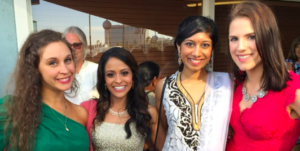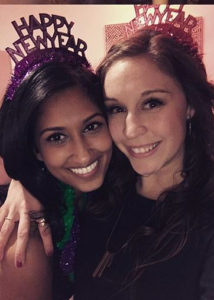February 8th, 2018
Doctoring in Lipstick
Cassie Shaw, MD

Cassie Shaw, MD, is a 2017-18 Chief Resident in Internal Medicine at Saint Louis University Hospital in Saint Louis, MO
Why do I feel weird wearing lipstick in the hospital? Why do I have to announce myself as a doctor to gain respect from patients and other members of the hospital staff? In my short time as a physician, I have yet to find the answer to these questions, but they seem to lie in my set of XX chromosomes. As in all other areas of life as a female, being a doctor comes with a different set of rules than that of my male colleagues. These rules are never mentioned or taught, but they are apparent the first time you step foot into the role. We aren’t men, but we need to fit in with them and act like them — but we also have to act like women, in the right ways, of course. Confused yet? Same. Let’s consider some questions about the abilities of a physician who’s also a woman.

The photos in this post are dedicated to my female colleagues who are all creating their own mold as physicians. Brit, Physical Medicine and Rehab; Ellen, Internal Medicine and Michaela, Emergency Medicine
Question 1
Can she be a leader? Can she provide medical care and make critical decisions? Yes, with tremendous effort. I quickly learned to state my role clearly when walking into a room. “Hello, Mr. X, I am your doctor.” Of course, it’s inevitable that a patient, nurse, or family member will ask to talk to the “real doctor,” or say “oh, I’m not used to a lady doctor,” or reference a male colleague as “the doctor.” Even worse is when staff members double-check with a male in the room to see if my plan was the medical plan for the patient. Meanwhile, none of my male colleagues have ever been assumed to be any healthcare professional other than a doctor.
Question 2
Can a woman who is physician also be feminine? If we do not wear makeup, we are asked if we are sick or having bad day. If we do wear lipstick or a skirt, negative assumptions are made about our IQ and our abilities as a doctor. Not only is our appearance a careful balance, but so are our interactions. A woman cannot use even the slightest tone of forcefulness when advocating for her patient without being labeled as that 5-letter word that begins with a b: bossy. In fact, if we aren’t sugary sweet, we are quickly written off as being angry, rude, or a another 5-letter word that begins with a b. (Use your imagination.) Meanwhile, when my male colleagues do the same, it causes a flurry of action to complete the task they’ve asked to be done without a single mention of his mood, how his day must be going, or his hormones.
Question 3
Can women work as physicians and have a home life? Yes, but to many, your home life is more important than your career life. Ultimately, society doesn’t judge us by our accomplishments at the bedside, but on those within the home. Am I married? Have I had children? (Shouldn’t the real question be, why does it matter? I spent 23 years completing the rigorous education and training required to obtain the job I dreamed of and that accomplishment is swiftly diminished by these two questions.) I have a huge fear of moving forward with having children because I wonder what might happen to my career. The life of a physician is far from flexible. My partner (and the would-be baby-daddy in this hypothetical scenario) is also a physician, but you can have one guess as to who society would expect to give up a portion of their career in order to raise a child. Or worse, if I did not cut back at work and hired help instead, I would be that terrible mother whose children are “raised by a nanny.” Again, not a word would be said about my partner’s work load as a physician who is male.
Okay, if it wasn’t obvious, I’m being facetious when asking and answering these questions. Women can be, and are, accomplished, astute clinicians, who are leaders in their fields and at the bedside, all while wearing whatever makeup they choose and maintaining whatever work-life balance they desire. However, these are all challenges that they face daily. I attribute many of these challenges to the way women entered the role of a physician. Like all of our roles in male-dominated fields, women before me fought to obtain foothold here. They weren’t welcomed as physicians in their own right, so they squeezed themselves as closely as they could into the mold of a physician created by their male counterparts. It’s obvious, though, that we aren’t made to fit that mold. We have our own mold, but that does not preclude us from being excellent physicians.
Recently, as I reflected on all of these experiences, I decided to make a change. I started small: I wore lipstick while on service. Initially, it was uncomfortable and awkward but when I assisted my intern with her first lumbar puncture while rocking my sassy pink lipstick, it was a tiny, but empowering, salute to my femininity. I had both worlds exactly as I wanted them. I wasn’t blending into my male-dominated surroundings. I was forming my own mold. It wasn’t just about lipstick anymore.
So, to end this blog, I’m looking right at my co-physicians who also happen to be women. Remember, we aren’t female physicians or “lady doctors.” There is no need for that gender-defining adjective. We are physicians and, ladies, we are crushing it. We are balancing things our male counterparts would never dare to try and can never understand. However, we are still doing it all within the mold created by men. It’s time to break out of that mold. It’s time to show off our power and stop blending. It’s time to do things our own way.






Love this!!! K Kay Moody DO MPH FACEP FAAEM, wife and mother of 5 kids. I love practicing in lipstick!!! Thank you for being YOU!!!
Hi…Hats off to the wonderfully written article. I will be a Physician in few months after my final exams. I have also faced the same and could corelate with each and every sentence.
Our patients and their relatives have found themselves in a strange universe that they are trying to navigate- so it is not surprising that in a situation where most of the females they see are nurses or other staff, they assume that the next female is not the doctor. Whereas a male in a suit is almost certainly a doctor, and even in scrubs, is still probably a doctor. It is our job to introduce ourselves and help them understand our role. It is easier if you suit up, have a uniform of some sort that designates you as a doctor. As you get older, it does get easier, as it is easier for patients and relatives to differentiate you from all the other females they meet. (One up side of getting wrinkles!) You still have loads of power and authority but sometimes it doesn’t feel that way or patients, relatives and staff (and even ourselves) are too overwhelmed to be able to see it clearly. There are lots of choices as has to how to run your life including family, and none of these are easy or perfect even for men for all our needs or aspirations. We all have different strengths. So all we can do is do our best, be kind to ourselves, our familiars, patients, relatives and coworkers and try and find some joy. If that is bling or jewellery or comfy shoes or heels- go for it!
And not to mention that you have to work thrice as hard to prove that you are equivalent in talent to men. If you are sick or pregnant or have a child to take care of you are simply labelled as the one making excuses.
So recognizable and how cool and powerful are we? Showing up every day, rocking the lipstick, the workload, the standing up against prejudice. The world better be ready for us: in the Netherlands 70% of physicians graduating these days is female, so luckily I don’t hear this comments as much as last year when I worked in Australia.. Young countries still have to adjust their way of thinking and their old values/ideas.In stead of daily I know only have to explain that I am not the nurse once a month.. Which makes working life less frustrating. All the best to you being your best self and being a great doctor. Because yes we are!
Hi Cassie, you open-up many realistic yet truthful question. Very normal feeling, many Internist in Houston like me feel the same way. The more you are curious the more you want to improve with your practice. Through the times, what you are feeling right now is very different after months or years.
Hi Cassie, thank you for your vulnerability. I encourage you to explore what it is in the structural and institutional that contributes deeply to what you are feeling. I also encourage you to really sit with the feelings of discomfort and see if you can forge a new way forward. What patients and families really need is the vulnerability of providers to hear their plan, to hear their hurt and to walk alongside them as an advocate. Can their not seeing you as a position of power be turned into a strength? Power can force people who are deeply vulnerable into submission, but empathy and curiosity can draw people who are deeply vulnerable into their own strengths and courage.
As a minority, a woman, and a non-physician-clinician, and a health system leader and educator, the power dynamics are daily present. It is in seeking to understand them and then realizing that the power dynamics and the heirarchy are the toxicity, that I have stopped trying to use power pathways to make an impact but rather use the lack of power as a pathway to connection. Best wishes as you train, Janice